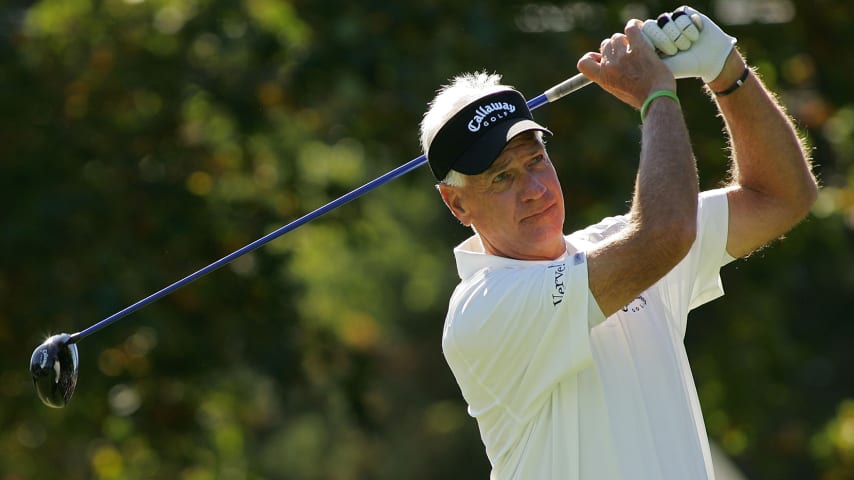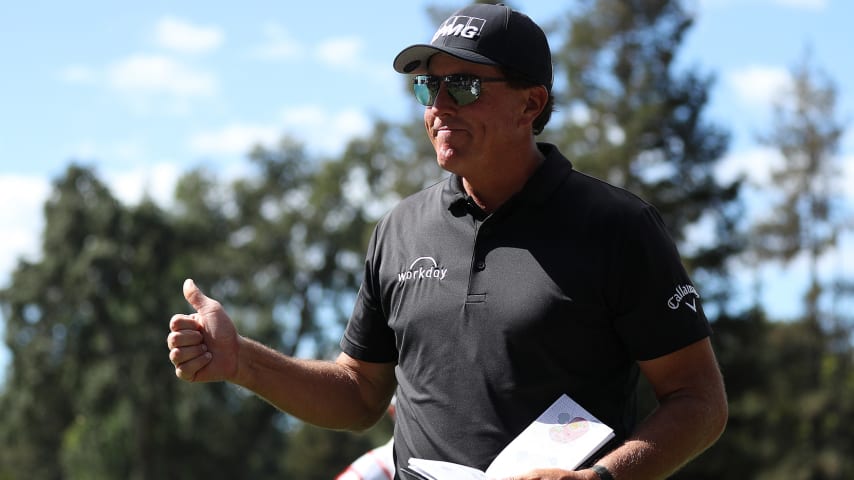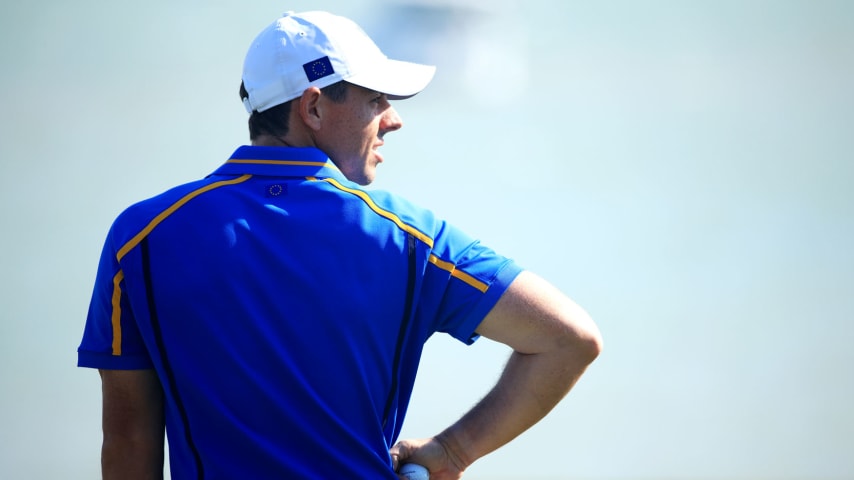Nicklaus-Jacklin Award presented by Aon inspired by one of golf’s great gestures
7 Min Read

The honor highlights players who see the bigger picture
Written by Justin Ray,
The honor highlights players who see the bigger picture
The 1969 Ryder Cup at England’s Royal Birkdale Golf Club featured legends like Jack Nicklaus, Tony Jacklin, Lee Trevino, Peter Alliss and U.S. Captain Sam Snead. While the U.S. Team retained the Cup, history remembers that week not just for the final score, but for one admirable act of sportsmanship that illustrated the power of better decisions that are made with clarity and confidence in the most critical moments.
Nicklaus conceded a short putt to Jacklin on the final hole of the deciding match, assuring that the two teams finished in a 16-16 tie. Now remembered as ‘The Concession,’ Nicklaus’ gesture ensured the first tie in Ryder Cup history. Nicklaus did not want Jacklin, a national hero after winning that year’s Open Championship, to face the possibility of a costly miscue in that crucial situation.
“I don't believe you would have missed that, but I’d never give you the opportunity in these circumstances,” Nicklaus said. The United States retained the Cup but Nicklaus faced criticism from those who felt he should have made Jacklin hit the putt.
Nicklaus’ act marked the beginning of a lifelong friendship between the two champions, and is remembered as one of the greatest gestures of sportsmanship in the game’s history.
In celebration of this great act, the PGA of America, Ryder Cup Europe and Aon are rolling out a first-of-its-kind award this week at Whistling Straits. The Nicklaus-Jacklin Award presented by Aon will go to the player from each team who sees the bigger picture and who makes better decisions critical to sportsmanship, teamwork and performance. At the conclusion of the Ryder Cup, a committee headed by Mr. Nicklaus and Mr. Jacklin will name the first recipients of the Nicklaus-Jacklin Award. The selection committee will also include past Ryder Cup Captains Paul Azinger and Paul McGinley; Executive Chaiman International Business at Aon, Carlo Clavarino; as well as representatives from the PGA of America and PGA of Great Britain and Ireland, Jim Richerson and Alan White, respectively.
Ryder Cup history is filled with instances of teamwork, sportsmanship, and of course, elite performance that are worthy of recognition. The Nicklaus-Jacklin Award presented by Aon brings all of those key traits of the Ryder Cup together, highlighting the players who most embody the spirit of this great event.
So, what are some historical performances that demonstrate the clarity, confidence and proper decision-making that the Nicklaus-Jacklin Award presented by Aon hopes to highlight? Let’s revisit some below.
Teamwork: Seve Ballesteros & Jose Maria Olazabal
Europe’s anchor in 1987 was Seve Ballesteros, a four-time major champion who was making his fourth Ryder Cup appearance. But individual talent alone cannot guarantee Ryder Cup success. A cohesive team strategy that extracts the best out of each player is essential.
“Ballesteros… was a genius as far as I was concerned,” Jacklin, the European captain, recalled recently. “But half his teammates were in awe of him. If you put them in with him, they would never admit to it, but they were overawed.”
Jose Maria Olazabal, aged 21, was not only a Ryder Cup rookie, but the youngest player for either side that week. Ballesteros saw something in Olazabal that would spark the beginning of the greatest partnership in Ryder Cup history.
“I believe Seve approached Tony and said, ‘Tony, don’t you worry, put me with Jose and we’re going to be OK,” Olazabal recalled.
‘OK’ was quite an understatement. The duo won three of their four matches together that week as Europe won its second Cup in a row. They would go on to amass an 11-2-2 record as a pairing (12 total points won), the most prolific duo in the history of the event. The success of the team tabbed the “Spanish Armada” shows the importance of clarity of mind and proper decision-making in stressful situations. Ballesteros’ ability to recognize the ideal sidekick helped Europe to its first victory on American soil.
“Jose Maria wasn’t intimidated by Seve in any way, shape or form,” said Jacklin. “They were both there together and they were both countrymen, so they fed off each other. It was wonderful.”
Sportsmanship: Darren Clarke
In 2006, European captain Ian Woosnam had two captain’s picks for the competition at The K Club in Ireland. With one of them, he selected Darren Clarke, whose wife Heather died of cancer just six weeks before the matches. As play unfolded that week, the overwhelming support for Clarke emanated not just from his own teammates, but his competitors, as well.
“It was incredible how our team got behind Darren,” Woosnam said recently, “and how the American team got behind Darren, as well.”
“Every one of them (the American team) spoke to me and gave me a hug,” Clarke said. “They made me feel like I should be there.”
Clarke’s play showed be belonged. He won all three matches he played, including a 3-and-2 victory in singles over Zach Johnson. Johnson conceded a 4-foot putt to seal the match for Clarke, and the Europeans rolled to an 18-9 victory.
“Woosie took a huge gamble in picking me for the team,” Clarke recently said. “I did tell him I was ready to play, but then again in that scenario nobody knew how I was going to play. But the support they showed for me that whole week was incredibly special.”
“Darren being here was an inspiration itself,” said Tiger Woods in 2006. “And his play was remarkable.”
Woosnam’s confidence in Clarke, who overcame incredible circumstances at The K Club, paid off.
Performance: Exceeding Expectations
All competitors enter the Ryder Cup carrying the burden of expectation. The hopes of their respective nations lies on the talented shoulders of 24 of the world’s greatest players. The quickest way to become a Ryder Cup legend is to exceed those expectations and lead your side to victory.
‘Expected points’ are the predictive baseline for a player’s expected output in a given Ryder Cup week. This number is generated by a number of factors, including player form, course-fit statistics, past performance in team events, and match play record.
Perhaps no player has best embodied outperforming expectations in recent years at the Ryder Cup than ‘The Postman,’ Ian Poulter. In his six Ryder Cup appearances dating to 2008, Poulter has an expected points total of 9.71. He has blown away that total, accumulating 15 points. Poulter will look to improve on his 14-6-2 career match record as a captain’s pick this year at Whistling Straits.
On the American side, Jordan Spieth has amassed an impressive Four-ball record, winning five of his six career matches. His five points won in that format since his Ryder Cup debut in 2014 far exceed his expected sum of 3.09. Spieth and Justin Thomas combined to win both of their four-ball matches in Paris three years ago.
In addition to qualitative factors like sportsmanship and teamwork, the selectors will use objective data, such as a player’s performance against his expected points, to determine the recipient of the first Nicklaus-Jacklin Award presented by Aon.
Looking forward to Whistling Straits
According to Twenty First Group analysis, no course on the 2015 PGA TOUR schedule valued extra driving distance more than Whistling Straits did at the PGA Championship.
U.S. Captain Steve Stricker demonstrated strong decision-making by using that data to shape his team. Eight of Stricker’s 12 players ranked in the top-50 in driving distance during the last PGA TOUR season. All but one player – reigning Open Champion Collin Morikawa – had above-TOUR-average distance in the 2020-21 season. The United States’ power contingent is led by Bryson DeChambeau, who led the TOUR in Strokes Gained: Off-the-Tee in 2021 and set the single-season driving distance record (323.7 yards).
The European side will bring some top-heavy talent off the tee to the party, as well. Four of the top five players in Strokes Gained: Off-the-Tee last season will play for Europe: Jon Rahm (2nd), Sergio Garcia (3rd), Rory McIlroy (4th) and Viktor Hovland (5th). Europe boasts five of the top 15 players in Strokes Gained Off-the-Tee for the season, while the Americans have just two (DeChambeau and Brooks Koepka).
Power will invariably be a significant factor when determining which side wins the Cup later this week in Wisconsin.












